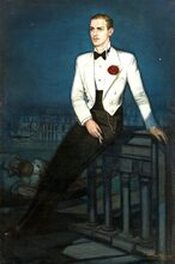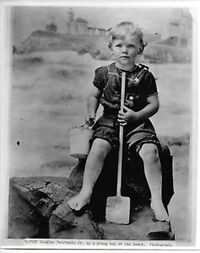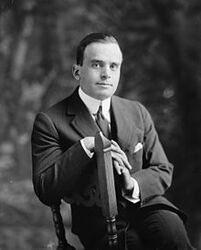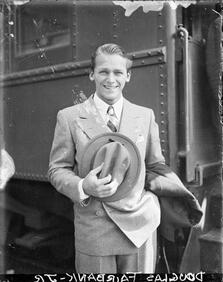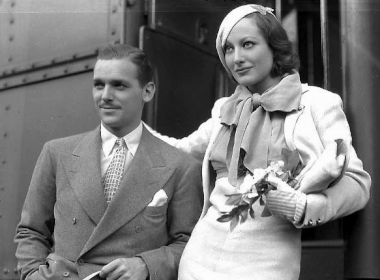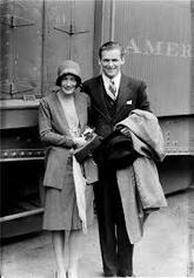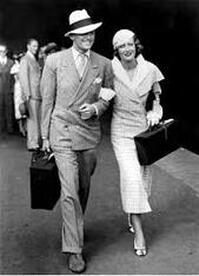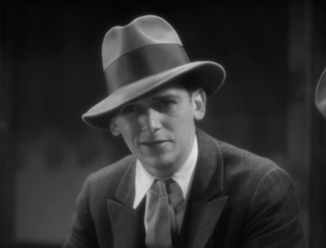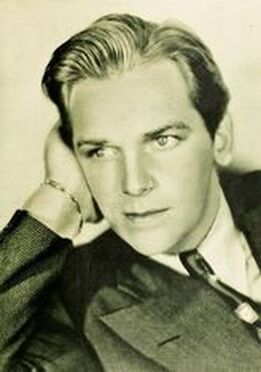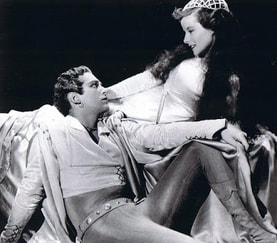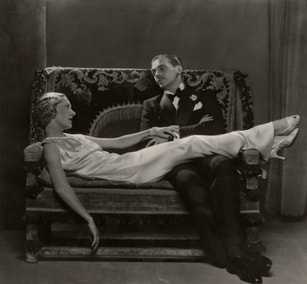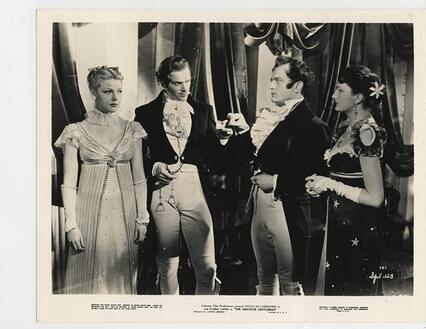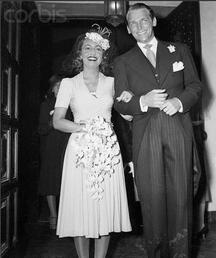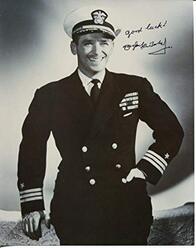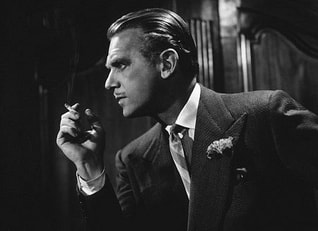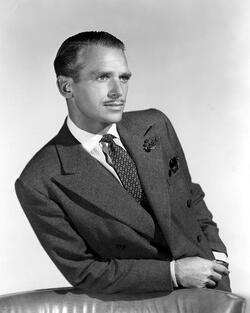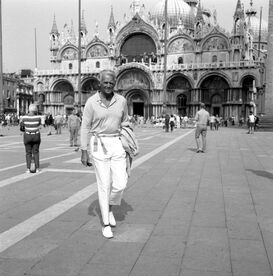|
name: Douglas Fairbanks Jr.
birth place: New York City, New York, USA birth date: 9 December 1909 zodiac sign: Sagittarius death place: New York City, New York, USA death date: 7 May 2000 languages: English, French Profile of Douglas Fairbanks Jr.
Douglas Elton Fairbanks Jr., KBE, DSC (December 9, 1909 – May 7, 2000), was an American actor and producer, and a decorated naval officer of World War II. He is best known for starring in such films as The Prisoner of Zenda (1937), Gunga Din (1939) and The Corsican Brothers (1941). He was the son of actor Douglas Fairbanks and was once married to Joan Crawford.
I am not a socialite, although I seem to have got the reputation for being one. I have some very good friends who happen to be in the so-called Society; but Society as such is a bore and holds no fascination for me.¨` Biography of Douglas Fairbanks Jr.
Douglas Elton Fairbanks Jr. was born in New York City; he was the only child of actor Douglas Fairbanks and his first wife, Anna Beth Sully. Fairbanks's father was one of cinema's first icons, noted for such swashbuckling adventure films as The Mark of Zorro, Robin Hood and The Thief of Bagdad.
His parents divorced when he was nine years old, and he lived with his mother in New York, California, Paris and London.
Largely on the basis of his father's name, in May 1923 Fairbanks Jr. was given a contract with Paramount Pictures at age 13, at $1,000 a week for three years.
Paramount and he parted ways by mutual consent and Doug went to Paris to resume his studies. A year later he returned to the studio, hired at what Fairbanks called "starvation wages" also having him work as a camera assistant.
In 1927 Fairbanks made his stage debut in Young Woodley based on a book by John Van Druten. Fairbanks Jr received excellent reviews and the production was a success - the play did much to improve his reputation in Hollywood. A regular audience member was Joan Crawford with whom Fairbanks would become romantically involved and then married on June 3, 1929 at St. Malachy in New York City.
They travelled to Britain on a delayed honeymoon, where he was entertained by Noël Coward, Gertrude Lawrence, Beatrice Lillie, and Prince George, Duke of Kent. He became active in both society and politics, but Crawford was far more interested in her career and had an affair with Clark Gable. The couple divorced in 1933, but the divorce would not become final for another year.
In 1930, Fairbanks Jr. went to Warner Bros. to test for the second lead in Moby Dick (1930). Although he did not win the part, head of production Darryl F. Zanuck was impressed with Douglas's screen test, and cast him in an important role in The Dawn Patrol directed by Howard Hawks.
Fairbanks had an excellent role supporting Edward G. Robinson in Little Caesar (1931), filmed in August 1930. The movie was a big hit, and Warner Bros. offered Fairbanks Jr. a contract with cast and script approval. "By sheer accident, I had four successes in a row in the early '30s, and although I was still in my 20s, I demanded and received approval of cast, story and director. I don't know how I got away with it, but I did!" "The original script for Morning Glory, included the fantasy dream sequence in which Miss Hepburn and I would play at least two scenes, and possibly a third, of the greatest scenes between Romeo and Juliet. That certainly intrigued and tempted me. It seemed a unique opportunity for me to play Romeo, a dream part.
In 1934, Warner asked all its stars to take a 50 percent pay cut because of the Depression. Fairbanks Jr. refused and was fired from the studio. He received a job offer from Britain and spent the next few years there, taking a residence in London's Park Lane.
In 1934, Warner asked all its stars to take a 50 percent pay cut because of the Depression. Fairbanks Jr. refused and was fired from the studio. He received a job offer from Britain and spent the next few years there, taking a residence in London's Park Lane.
Fairbanks Jr. returned to Hollywood when David O. Selznick offered him the role of Rupert of Hentzau in The Prisoner of Zenda (1937). He had been reluctant to accept the role but his father urged him to do it, saying it was "actor proof".The movie was a big success.
In December 1937 he signed a non-exclusive contract with RKO to make two films a year for five years, at $75,000 a film. Fairbanks had his biggest-ever hit with RKO's Gunga Din (1939), alongside Cary Grant and Victor McLaglen.
On April 22, 1939, Fairbanks married Mary Lee Hartford (née Mary Lee Epling), a former wife of Huntington Hartford, the A&P supermarket heir. He remained devoted to her until her death in 1988.
Although celebrated as an actor, Fairbanks was commissioned as a reserve officer in the United States Navy when the United States entered World War II and was assigned to Lord Mountbatten's Commando staff in the United Kingdom.
Fairbanks returned to Hollywood at the conclusion of World War II. But the few movies he made during the next two years were not very successful.
As a confirmed Anglophile, Fairbanks spent much time in the United Kingdom, where he was well known in the highest social circles. He was made an Honorary Knight Commander of the Order of the British Empire (KBE) in 1949 and moved there in the early 1950s.
On May 30, 1991, Fairbanks married Vera Lee Shelton, a merchandiser for QVC Network Inc.
On the morning of May 7, 2000, Fairbanks died at the age of 90 of a heart attack and was interred at the Hollywood Forever Cemetery in Hollywood, California, in the same tomb as his father.
0 Comments
Leave a Reply. |
Categories
All
Archives
December 2023
|
